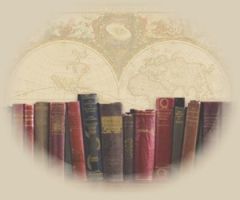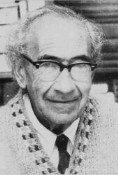|
From the Jerusalem Post, May 6, 1977
By Cynthia Ozick
AVRAHAM REGELSON, distinguished Hebrew-English-Yiddish poet, essayist and translator, winner of a number of prestigious Israeli literary prizes, recently turned 80. On the occasion, he was invited to the U.S. to receive a prize from New York University's Hebrew Department for his "lifetime's contribution to Hebrew letters." Born in Russia, Regelson was brought to the U.S. by his parents at age 9. He first settled in Eretz Yisrael in 1932, going back to the U.S. four years later, and returning to Israel with his family in 1949. Today he lives with his wife in Neve Monosson. Following are extracts from a tribute paid to Regelson at the N.Y.U. prize ceremony by his niece, CYNTHIA OZICK, a distinguished writer in her own right.
VERY DEAR, very beloved, esteemed Uncle:
It is my profound privilege to address you here at New York University in the presence of so many distinguished representatives of the University, the Israeli community, the Jewish community, and the universal and eternal community of writers and poets. I add to this a more intimate community: your friends and your relations who see you now for the first time in 29 years.
It is no accident that this number – 29 years – is exactly equivalent to the number of years that have passed since the restoration of the nation of Israel as an independent polity. Soon after independence was declared in 1948, you left to make your permanent home on that soil which Theodor Herzl called Altneuland, the Land that is both ancient and beginning.
You did this because you are an idealist. By now the English language, perhaps in America as nowhere else, has corrupted this fine old word: idealist. Often enough it is used as a term of abuse for someone who does not have his feet on the ground. But you knew – you have always known – what ground you meant to have your feet on: it was the holy ground of Israel, and you did not hesitate to translate the words of immemorial promise into the life of action. So, for the second time, you became an immigrant into a land of promise.
The first time you were an immigrant you were only six years old. You, your mother Rachel, your baby brother Rubin, your little brother Joseph, your big brother Jacob, and your older sister Shifra all crossed the sea on the steamer Rotterdam and landed in Castle Garden in 1906. Your grown-up sisters Itke and Mary, and your grown-up brother Moshe-Elia (Morris), and your father Yuda-Velvl had already arrived in America. Of all this family, only you and my mother Shifra remain. But it would be a kind of metaphysical mistake to say that all those other hopeful travelers are not represented here. Look out into this audience, and you will see their descendants, the incarnation of all their dreams of ripening.
You grew up in America. You are an American. It was the idealism of America that made possible, that nurtured, your idealism. In America you became the father of a family of musicians and mathematicians. I remember your bright voyages to the Crotona Park Library in the Bronx; when you returned with piles of books in your arms, brought home for your children – I would think you had been to Paradise. It was in America that you determined never to destroy anything that contained in it the breath of life. Not so many years ago I came across a poem you wrote, in English, before World War I – a poem passionately anti-war. In America you became a pacifist. In America you became a vegetarian. In America you became a Zionist. In America you became a Hebrew poet.
Of all these remarkable idealisms – each one put actively into practice – perhaps the most astounding is the latter: In America you became a Hebrew poet! Of course you were born to be a poet. But you grew up, after all, in an English-speaking country. You were educated in the English language. I leave aside for the moment the fact that you are as artful and as powerful in the Yiddish language as you are in Hebrew and in English. Would not the natural course of any writer's development dictate that you should become, in America, an American poet? You were as stirred by Whitman, by Blake, by Keats, as you were by Bialik. You are still equally in love with Keats and with Bialik. Only recently you put me in charge of an only partly successful hunt for certain little-known poems of William Morris. Your command and love of English literature is vaster – I say this in the secure knowledge that I am speaking truthfully – vaster than a thousand professors of English from one end of the American continent to the other. And yet you chose Hebrew. When you were a small child you had already chosen Hebrew. What prepared you for this?
I am told that your father, Yuda-Velvl, whose trade was cabinet-making, sometimes skipped going to work for a day. The reason he would skip a day was that when the mail came in the morning, it sometimes brought the latest Haskala periodical – Haskala being the movement dedicated to reviving Hebrew as a living and newly literary language – and Yuda-Vlvl, your father and our grandfather, would immerse himself all day in the renaissance of Hebrew literature and philosophy until it got too dark to carve wood.
Was it because of the influence of Yuda-Velvl that you chose Hebrew? Perhaps. But one of your brothers, also an idealist, became a farmer, and the rest became pharmacists. Only you chose Hebrew. Only you became, in America, a Hebrew poet. Immediate family history cannot account for it. Perhaps nothing can account for it. You were clearly born a poet, but you made yourself into a Hebrew poet. You wanted to ascend to the eternal language, to the language that, because it is rooted in holy soil, has jumped the boundaries of all geography and has instructed the conscience of the world.
Though there are present here other masterful poets and writers, both in Hebrew and Yiddish, nevertheless the truth is most of us in this room cannot read your poetry. Hebrew, especially your lyrical, erudite, intricate, philosophical Hebrew, is not accessible to most of us. We are deprived of your genius. It is as if we were shut off from Milton; from Keats; from Yeats. You are of their spirit.
But we are not shut off from homage. We know what you have done. We know what you have made. The deficiency of Hebrew literacy in our generation will be remedied, repaired, redeemed by a more vigorous generation. Meanwhile we can in ourselves hope to rise to your idealism, your humanism, your reverence for person, and place, and life, and your equal reverence for the divinely-given words that carry this blessed freight. In choosing "idealism," you have chosen that fusion of dream and deed we all aspire to. Because you chose Hebrew, Hebrew chose to bestow on you the mantle of permanence.
It is in recognition of your permanence that we rise to you today. |



